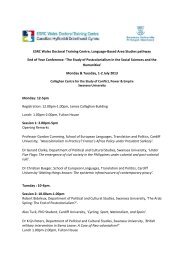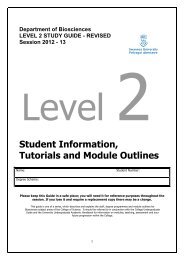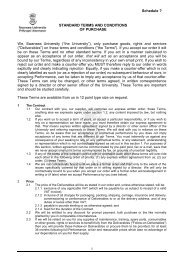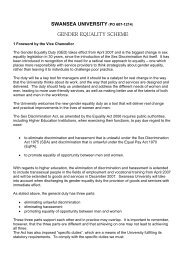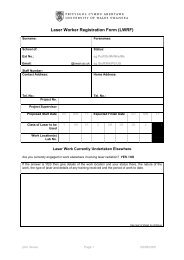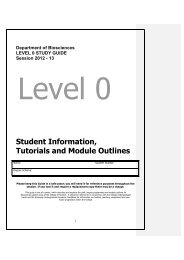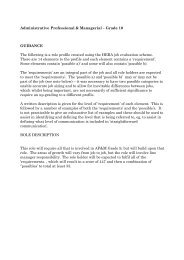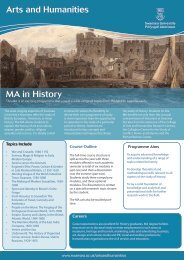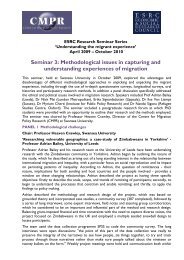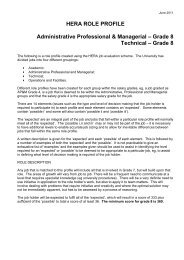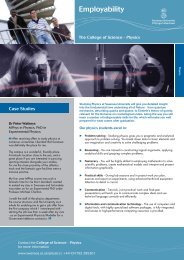Administrative Professional & Managerial â Grade 5 - Swansea ...
Administrative Professional & Managerial â Grade 5 - Swansea ...
Administrative Professional & Managerial â Grade 5 - Swansea ...
Create successful ePaper yourself
Turn your PDF publications into a flip-book with our unique Google optimized e-Paper software.
June 2011<br />
HERA ROLE PROFILE<br />
<strong>Administrative</strong> <strong>Professional</strong> & <strong>Managerial</strong> – <strong>Grade</strong> 7<br />
Technical – <strong>Grade</strong> 7<br />
The following is a role profile created using the HERA job evaluation scheme. The University has<br />
divided jobs into four different groupings:<br />
Academic;<br />
<strong>Administrative</strong> <strong>Professional</strong> and <strong>Managerial</strong>;<br />
Technical;<br />
Operations and Facilities.<br />
Different role profiles have been created for each group within the salary grades, eg, a job graded as<br />
AP&M <strong>Grade</strong> 4, is a job that is deemed to be within the <strong>Administrative</strong> professional and <strong>Managerial</strong><br />
groups and that the salary grade 4 is the appropriate salary grade for the job.<br />
There are 14 elements (issues such as the type and level of decision making that the job holder is<br />
required to participate in) to each profile and each element contains an ‘expected’. Some elements<br />
contain ‘possible i’ and some will also contain ‘possible ii and ‘possible iii’).<br />
The ‘expected’ are an integral part of the job and jobs that fall within a particular role profile will<br />
normally meet all of the ‘expected’. The ‘possible i, ii and iii’ may or may not be part of the job – it is<br />
necessary to have additional levels to enable accurate job sizing and to allow for inevitable<br />
differences between jobs that fall within the same role profile.<br />
A written description is given for the ‘expected’ and each ‘possible’ of each element. This is followed<br />
by a number of examples of both the ‘expected’ and the ‘possible’. It is not practicable to give an<br />
exhaustive list of ‘examples’ and the examples given should be used to assist in identifying the level<br />
required for an ‘expected’ or ‘possible’ to be deemed to be appropriate to a particular job, eg, to assist<br />
in defining what level of decision making is required of the job holder.<br />
ROLE DESCRIPTION<br />
Any job that is matched to this profile will include all that is involved in <strong>Grade</strong> 6, but will build upon that<br />
role. The areas of growth will vary from job to job, but engaging with the written word at a moderately<br />
complicated level on a weekly basis will be an integral part of the job.<br />
The job will require an ability to work on own initiative identifying the priorities within their own work<br />
but also assisting with initiative and problem solving at team level in situations where the<br />
answers/solutions are not routine or obvious.<br />
The job holder will be expected to fulfil all of the ‘expected’, which will result in a score of 281 and<br />
sufficient of the ‘possible’ to score at least 33. The minimum score for grade 7 is 314<br />
APM 7 Role Profile
COMMUNICATIONS<br />
Oral communication:<br />
Covers communication in both informal and formal situations<br />
EXPECTED: Communicating straightforward information in a clear and accurate manner will be an<br />
important, constant and integral part of the job. Such communication will be a substantial part of the<br />
oral communication element of the job (generally at least one-third).<br />
EXAMPLES:<br />
Discussing work requirements/priorities with a supervisor.<br />
Reporting problems – machinery that is not working – to a supervisor or manager.<br />
Requesting stocks-supplies from a supervisor.<br />
Attending and participating in team meetings.<br />
Giving directions to visitors/students.<br />
Providing straightforward information to colleagues or others.<br />
Dealing with telephone calls – taking straightforward messages.<br />
Giving/receiving straightforward instructions relating to work systems.<br />
POSSIBLE i): In addition to the above the job holder will clarify matters of a non-routine nature.<br />
This will include information that needs careful explanation or interpretation to help others understand,<br />
taking into account what to communicate and how best to convey the information to others. The role<br />
holder will use language over and above that found in every day conversation and will be expected to<br />
place the contents in a logical order, choose an appropriate method of delivery and employ techniques<br />
to ensure understanding. Such communication will be an important and integral part of the job, but<br />
constancy will be less than that required for <strong>Grade</strong> A. It will be communication that:<br />
i. requires considerable consideration as to the format and language used;<br />
and/or<br />
ii. clarifies complicated issues;<br />
and/or<br />
iii. employs a range of language over and above that found in standard everyday usage.<br />
EXAMPLES<br />
Explaining matters that are specialist, perhaps technical, legal or financial. This will involve the<br />
use of language that would not be considered to be straightforward or everyday.<br />
Making presentations involving explanations of specific topics of complicated or involved<br />
procedures/matters to those who do not have a high level of familiarity or knowledge of those<br />
topics.<br />
Ordering specialist equipment where there is a need to discuss technical specifications with the<br />
customer and/or the provider.<br />
Explaining complicated/involved procedures and policies.<br />
Persuading colleagues to adopt a viewpoint, where considerable debate is required to achieve<br />
this.<br />
Explaining matters that are specialist, perhaps technical, legal or financial. This will involve the<br />
use of language that would not be considered to be straightforward or everyday.<br />
Making presentations involving explanations of specific topics of complicated or involved<br />
procedures/matters to those who do not have a high level of familiarity or knowledge of those<br />
topics.<br />
Ordering specialist equipment where there is a need to discuss technical specifications with the<br />
customer and/or the provider.<br />
Explaining complicated/involved procedures and policies.<br />
Persuading colleagues to adopt a viewpoint, where considerable debate is required to achieve<br />
this.<br />
<strong>Grade</strong> 7 Role Profile 2
POSSIBLE i): The job holder will clarify matters of a non-routine nature (see above for further detail<br />
and examples) as a substantial part of the oral communication element of the job (generally at least<br />
one-third).<br />
POSSIBLE ii): In addition to the above (including Possible i) the job holder will convey and<br />
understand communication of a highly complex or conceptual nature which typically would not be<br />
understandable to non-specialists. It will involve complex conceptual ideas or complex information<br />
which may be highly detailed, technical or specialist. Such communication will be an important and<br />
integral part of the job, but constancy will be less than that required for <strong>Grade</strong> A.<br />
EXAMPLES might include<br />
Providing a detailed explanation of how a complex system or a set of regulations operates, eg, a<br />
new funding methodology.<br />
Conveying/explaining complex legal and financial requirements and their implications to<br />
colleagues, eg, reading, translating and communicating to others the implications of a white<br />
paper on immigration and work restrictions.<br />
Influencing others’ thinking and negotiating with them to achieve an outcome in difficult situations<br />
where differences of opinion are not easily resolved.<br />
Interpreting technical or conceptual information into or from a foreign language.<br />
EXPECTED: ABC 20<br />
POSSIBLE i): AAC +8<br />
POSSIBLE ii): AAB +15<br />
<strong>Grade</strong> 7 Role Profile 3
Written or electronic communication and visual media:<br />
Covers communication in both informal and formal situations.<br />
EXPECTED: Communicating straightforward information in a clear and accurate manner will be an important,<br />
constant and integral part of the job. Such communication will be a substantial part of the written<br />
communication element of the job (generally at least one-third).<br />
EXAMPLES<br />
Communicating/receiving work requirements/priorities from a supervisor in the form of a written<br />
worksheet or similar.<br />
Reporting problems – machinery that is not working – to a supervisor or manager.<br />
Requesting stocks/supplies from a supervisor.<br />
Following a plan/map to give directions to visitors/students (eg to find a particular room somewhere<br />
within the University campus).<br />
Providing straightforward information to colleagues or others – this may include information which<br />
requires a precise and specialized knowledge relevant to the area that the role holder is working in.<br />
Dealing with telephone calls – taking straightforward messages.<br />
Giving receiving straightforward instructions relating to work systems.<br />
Writing a set of simple instructions.<br />
Completing simple forms.<br />
In addition to the above the job holder will clarify matters of a non-routine nature. This will include information<br />
that needs careful explanation or interpretation to help others understand, taking into account what to<br />
communicate and how best to convey the information to others. The role holder will use language over and<br />
above that found in every day conversation and will be expected to place the contents in a logical order,<br />
choose an appropriate method of delivery and employ techniques to ensure understanding. Such<br />
communication will be an important, constant and integral part of the job, but constancy will be less than that<br />
required for <strong>Grade</strong> A. It will be communication that:<br />
i. requires considerable consideration as to the format and language used;<br />
and/or<br />
ii. clarifies complicated issues;<br />
and/or<br />
iii. employs a range of language over and above that found in standard everyday usage.<br />
EXAMPLES<br />
Writing explanations of matters that are specialist, perhaps technical, legal or financial. This will involve<br />
the use of language that would not be considered to be straightforward or everyday.<br />
Making presentations (to include a written aspect, eg, slides and/or handouts) involving explanations of<br />
specific topics of complicated or involved procedures matters to those who do not have a high level of<br />
familiarity or knowledge of those topics.<br />
Ordering specialist equipment where there is a need to communicate technical specifications with the<br />
customer and/or the provider.<br />
Reading and needing to act upon (or explain to others) complicated/involved procedures or course entry<br />
requirements.<br />
Persuading colleagues to adopt a viewpoint, where considerable debate is required to achieve this.<br />
Providing feedback or resolving conflicts where some tact and diplomacy are required.<br />
Reading and needing to act upon (or explain to others) a report on cost or operational implications of a<br />
decision.<br />
Conducting job (or similar) interviews.<br />
Drafting guides to course modules.<br />
Writing a case for a grant application.<br />
Writing up the results of an experiment.<br />
POSSIBLE i): In addition to the above, the requirement to clarify matters of a non-routine nature (see above<br />
for further details and examples) will be a substantial part of the oral communication element of the job<br />
(generally at least one-third).<br />
EXPECTED: ABC 17<br />
POSSIBLE i): AAC +6<br />
<strong>Grade</strong> 7 Role Profile 4
PASTORAL CARE AND WELFARE<br />
This element deals with the extent to which the job holder is required to be involved with the well<br />
being of students and staff within the University, in both informal and formal situations.<br />
EXPECTED: Pastoral Care may be a minor part of the job.<br />
It is expected that any member of staff of the university will show due care to colleagues and<br />
students, but it is not part of this role to have any specific responsibility for the pastoral care and<br />
welfare of others.<br />
POSSIBLE i): The job holder may work in a specialist area such as Human Resources or Student<br />
Services therefore is expected to show sensitivity to those who may need help, or in extreme cases<br />
are showing signs of obvious distress. The job holder is expected to initiate appropriate action by<br />
involving relevant people. Pastoral Care will be an important, constant and integral part of the job<br />
and pastoral care - at this level - will be a substantial part of the pastoral care element of the job<br />
(generally at least one-third).<br />
EXAMPLES<br />
Dealing with visitors/telephone calls (students or colleagues) who are upset, perhaps in tears<br />
– showing an appropriate level of sensitivity and referring them to those who can deal with the<br />
issues causing the distress.<br />
Dealing with visitors/telephone calls (students or colleagues) of someone who is not<br />
necessarily showing high levels of distress, but who has a considerable problem and needs<br />
assistance in dealing with it. Again this involves ascertaining what the problem is and<br />
referring it to those who can assist.<br />
POSSIBLE ii): The job holder will deal with predictable commonly occurring welfare issues or<br />
queries that are covered by documented procedures, when the matter can be referred to others for<br />
professional help, but the job holder will be involved with actually dealing with the matter. It is likely<br />
that the roleholder will be in a supervisory or managerial role, where there is the need to handle<br />
situations which require sensitivity, a high level of awareness of confidentiality and general tact and<br />
diplomacy. Pastoral Care will be an important and integral part of the job but constancy of pastoral<br />
care - at this level - will be less than that required for a grade A.<br />
EXAMPLES might include:<br />
Dealing with requests for special leave – giving permission (or not) not simply referring to<br />
others.<br />
Consideration of confidential mitigating circumstances when assessing assignments or<br />
examinations.<br />
Dealing with fairly straightforward performance issues.<br />
Investigating matters such as a member of staff accusing another member of staff of bullying.<br />
Counselling a member of staff or student who is suffering stress.<br />
Help with personal problems that are affecting performance.<br />
EXPECTED: BCC 13<br />
POSSIBLE i): ACC +8<br />
POSSIBLE ii): BBC +10<br />
<strong>Grade</strong> 7 Role Profile 5
TEAM DEVELOPMENT<br />
This element deals with the extent to which the job holder has some level of responsibility or<br />
involvement with the development of other members of their own work team.<br />
EXPECTED: At this level Team Development may be a minor part of the job, but there will be some<br />
involvement with the following:<br />
EXAMPLES<br />
Showing a new member of staff around the workplace.<br />
Showing a new member of staff how to use the telephone, photocopier or how the filing system<br />
works.<br />
Explaining any system or procedure that is relevant to the particular area of work, eg, how to<br />
obtain stationery or expenses.<br />
Assisting colleagues with straightforward computer procedures, eg, how to carry out mail merge in<br />
Word, as a one off.<br />
POSSIBLE i): The job holder will meet the requirements described in ‘Expected’ above but Team<br />
Development will be an important and integral part of the job and constancy of activities at this level will<br />
be a substantial part of the Team Development element of the job (generally at least one-third).<br />
POSSIBLE ii): In addition to meeting the requirements defined in ‘Expected’ (above) the job holder will<br />
train and guide others on specific tasks, issues or activities, to give advice, guidance and feedback on<br />
the basis of their own knowledge or experience. The job holder may deliver training. They will have a<br />
specialist knowledge or responsibility for a particular area or aspect of work and will ensure that other<br />
team members are kept up-to-date with new developments. It will involve providing training or instruction<br />
to other members of the work team on a regular basis. Team Development will be an important and<br />
integral part of the job, but constancy of team development - at this level - will be less than that required<br />
for a grade A.<br />
EXAMPLES<br />
Teach others how to use a specialist piece of software.<br />
Assist others in learning how to write formal minutes to include the University format and<br />
procedures.<br />
Assist others in learning an involved procedure or system specific to a particular field or area of the<br />
university, eg, the library system.<br />
Have responsibility for inducting new starters<br />
Have responsibility for a particular area of work and show others how to perform a task as part of<br />
their everyday work.<br />
The role holder may also teach/train other team members on a specific topic/area/specialism<br />
POSSIBLE iii): In addition to meeting the requirements defined in ‘Expected’ (above) the role holder will<br />
carry out training or development activity according to the needs of the individual or group. There will be<br />
a need to identify the training and development needs, current capabilities and future needs; to define<br />
the performance standards required and identify appropriate developmental activity. The job holder will<br />
assess the application of learning and give feedback and guidance on overall performance. Team<br />
Development will be an important and integral part of the job, but constancy of team development - at<br />
this level - will be less than that required for a grade A.<br />
EXAMPLES<br />
Identifying learning/development needs of team members, eg, through annual review and<br />
probation supervision/reports.<br />
Analysing achievement of team objectives and identifying learning needs arising from shortfalls.<br />
Conducting regular staff reviews and performance reviews and agreeing what needs to be done to<br />
satisfy any training or development needs.<br />
EXPECTED: BCC 14 POSSIBLE ii): BBC +11<br />
POSSIBLE i): ACC +9 POSSIBLE iii): BCB +12<br />
<strong>Grade</strong> 7 Role Profile 6
TEAMWORK AND MOTIVATION<br />
This element covers team work and team leadership. It may include the need to contribute as an<br />
active member of the team; motivating others in the team; and providing leadership and direction for<br />
the team.<br />
EXPECTED: Working at this level will be an integral, constant and important part of the job and the<br />
predominant level of the Teamwork and Motivation involvement of the job.<br />
The job holder will:<br />
Work with minimum supervision; being supportive and encouraging of others in a team.<br />
Build co-operation by setting an example and showing a flexible approach to delivering team<br />
results.<br />
Contribute to building team morale as an active participant in the team.<br />
Identify work priorities on a daily basis.<br />
Work to deadlines.<br />
Constantly assess the importance and urgency of matters and deal with both.<br />
EXAMPLES<br />
A professional/specialist member of staff who has to work with a team to meet the objectives of<br />
that team, but who has individual responsibility for some aspect or area of the team’s work.<br />
Managing small or routine projects (perhaps an event which occurs annually and the needs and<br />
deadlines vary little from one year to another).<br />
POSSIBLE i): In addition to the above there will be some need to work at a higher level; it will be an<br />
integral and important part of the job, but the amount and depth of involvement is less than the level to<br />
which the <strong>Grade</strong> A has been given. The job holder will have some involvement with the responsibility for<br />
managing a team (at least two other people).<br />
The job holder will have some involvement with:<br />
Clarifying requirements and agreeing task objectives.<br />
Organising and delegating work fairly according to individual abilities.<br />
Helping the team focus their efforts on the tasks in hand and motivating individual team members.<br />
Overseeing tasks of the work team.<br />
Allocating work, monitoring achievement by team members and providing feedback to them<br />
Taking initial remedial action if required and to praise the work of the team.<br />
Motivating the team, offering feedback, support and advice.<br />
Setting objectives for the team, taking account of the objectives of the Department, and planning<br />
ahead for at least one year.<br />
Assisting team members with difficult problems when they arise and generally offering advice and<br />
guidance and support to team.<br />
EXAMPLES<br />
Overseeing the work of a team, unit or section in a supervisory capacity (eg dining room,<br />
laboratory or workshop supervisor).<br />
Overseeing the completion of a project.<br />
Leading a course, module or pathway.<br />
POSSIBLE ii): The role holder may work at the level described in Possible i (above) but working at this<br />
level will be an integral, constant and important part of the job and the predominant level of the<br />
Teamwork and Motivation involvement of the job.<br />
EXPECTED: DADDD 20<br />
POSSIBLE i): DABDD +5<br />
POSSIBLE ii): DDADD +17<br />
<strong>Grade</strong> 7 Role Profile 7
SERVICE DELIVERY<br />
This element deals with the extent to which the job holder is required to be involved with the need to<br />
establish the level of service.<br />
EXPECTED: Working at this level is an integral, constant and important part of the job and that this<br />
is the predominant level of the Service Delivery involvement of the job.<br />
The job holder is expected to deal with internal or external contacts who ask for service or require<br />
information.<br />
EXAMPLES<br />
Contributing to the job holder’s area/section /department providing an efficient and effective<br />
service – this may involve ascertaining the requirements of an individual in relation to a<br />
particular activity or task.<br />
Responding to a request for information or assistance.<br />
Contributing to team meetings and discussions with ideas that will improve the efficiency of the<br />
area of work or resolve.<br />
Suggesting that an enrolment point be moved, as those waiting to enrol are creating queues<br />
that are so long that they are blocking an entry door and stopping others from entering the<br />
building.<br />
Suggesting that leaflets should be displayed in a more open and easy to access cabinet as<br />
students appear to be reluctant to open doors to take the leaflets.<br />
Advising that customers are not happy with the range of sandwiches that are available.<br />
Additionally there will be some need to work at a higher level, this will be an integral and important<br />
part of the job, but the amount and depth of involvement will be less than the level to which the<br />
<strong>Grade</strong> A has been given.<br />
The job holder is expected to:<br />
Adapt the service.<br />
Actively offer and promote the services of the University to others.<br />
Understand and explore customers’ needs and adapt the service accordingly to ensure the<br />
usefulness or appropriateness and quality of service (content, time accuracy, level of<br />
information, cost).<br />
EXAMPLES<br />
Sending out questionnaires to customers to ascertain if service is satisfactory – this will include<br />
analysing the results and acting upon them.<br />
Restructuring a team and changing areas of responsibility for team members in order to<br />
improve the service being offered.<br />
Recognising that VDU equipment (used by customers) is out of date and putting forward a<br />
recommendation to up date – this will involve identifying what new equipment and the cost. It<br />
may well involve ensuring that the costs do not exceed a given budget.<br />
Identifying a service being offered by competitors (this may be of an academic or service<br />
related nature, eg, a particular course that is popular in other Universities or services being<br />
offered to conferences by hotels) and recommending or establishing similar facilities. If this is<br />
done as a recommendation it would be accompanied by a business plan or similar level of<br />
information.<br />
POSSIBLE i): The higher level (described immediately above) will be an integral, constant and<br />
important part of the job and will be the predominant level of the Service Delivery involvement of the<br />
job.<br />
EXPECTED: ABD 25<br />
POSSIBLE i): DAD +22<br />
<strong>Grade</strong> 7 Role Profile 8
PLANNING AND ORGANISING RESOURCES<br />
This element deals with the extent to which the job holder is required to be involved with organising,<br />
prioritising and planning time and resources, be they human, physical or financial.<br />
EXPECTED: Working at this level will be an integral, constant and important part of the job and this<br />
will be the predominant level of the Planning and Organising involvement of the job.<br />
The job holder will decide their own pattern of work - plan, priorities and organise their own work or<br />
resources to achieve agreed objectives. It may involve supervisory responsibility of jobs that are of a<br />
fundamentally routine nature, eg, a supervisor with responsibility for drawing up rotas.<br />
EXAMPLES<br />
On a daily basis recognising work that is urgent and needs to be prioritised.<br />
Deciding when and how to respond to requests for information or assistance.<br />
Deciding when to order non routine replacement stock.<br />
Deciding when to draft articles/reports.<br />
Organising meetings – recognising that a meeting needs to be held, checking others’<br />
availability and booking rooms, hospitality etc.<br />
Ensuring that data is input into a data system in a timely fashion.<br />
Deciding when to draft an article.<br />
Producing a booklet.<br />
Designing and making a piece of equipment or software.<br />
Ensuring that a variety of systems and procedures are carried out, as and when required, eg<br />
filing, typing.<br />
POSSIBLE i): In addition the job holder will have some involvement/responsibility at a higher level.<br />
Working at this level will be an integral and important part of the job, but the amount and depth of<br />
involvement is less than the level to which the <strong>Grade</strong> A has been given.<br />
The job holder will plan, prioritise and organise the work resources of self and others within own area.<br />
The job holder will plan and manage small projects, ensuring the effective use of resources.<br />
EXAMPLES<br />
This may mean planning and organising a team where the work of the team is, in the main<br />
routine, but where there is a need to organise budgets. This will include planning staffing<br />
levels and resources to achieve objectives within those budgets.<br />
It may involve managing a small team; this team will include at least one professional/specialist<br />
whose work is not routine and priorities are not given or obvious.<br />
It may involve managing a project eg, organising a conference or event such as a graduation<br />
ceremony or open day, this will include establishing deadlines for colleagues whom the job holder<br />
does not line manage and ensuring that such people meet the required deadlines.<br />
POSSIBLE ii): The job holder will work at the level define in ‘Possible i’ (above), but working at this<br />
level will be an integral, constant and important part of the job and this will be the predominant level<br />
of the Planning and Organising involvement of the job.<br />
EXPECTED: DADDD 20<br />
POSSIBLE i): DABDD +5<br />
POSSIBLE ii): DDADD +17<br />
<strong>Grade</strong> 7 Role Profile 9
INITIATIVE AND PROBLEM SOLVING<br />
This element deals with the extent to which the job holder is required to be involved with identifying or<br />
developing options and selecting solutions to problems.<br />
EXPECTED: Working at this level is an integral, constant and important part of the job and that this<br />
is the predominant level of the Initiative and Problem Solving involvement of the job.<br />
The job holder will solve standard day-today problems<br />
EXAMPLES<br />
Advising people that a meeting has been cancelled.<br />
A member of a team, who has responsibility for supplies of stationery, identifying that more<br />
paper needs to be ordered.<br />
Recognising that a sign needs to be placed on an office door giving information on who<br />
works in the office.<br />
Maintaining equipment or machinery.<br />
Organising temporary cover for absent staff.<br />
Informing relevant people about an emergency such as illness.<br />
Making travel and accommodation arrangements.<br />
In addition the job holder will have some involvement/responsibility at a higher level. Working at this<br />
level will be an integral and important part of the job, but the amount and depth of involvement will<br />
be less than the level to which the <strong>Grade</strong> A has been given.<br />
The job holder will resolve problems where the optimal solution may not be immediately apparent –<br />
where there is a need to use judgement to resolve problems that are predictable but occur less<br />
frequently.<br />
EXAMPLES<br />
Dealing with straightforward absence, disciplinary and grievance problems at an informal<br />
level.<br />
Dealing with straightforward attendance problems.<br />
Dealing with a student’s failure to submit course work.<br />
Evaluating the strengths and weaknesses or equipment warranties.<br />
Solving electro-mechanical or IT system failures.<br />
Evaluate an alternative bench reagent in a laboratory after the standard one has been barred<br />
for use in particular conditions by the HSE.<br />
POSSIBLE i): The job holder will work at the ‘higher level’ (described immediately above), but<br />
working at this level will be an integral, constant and important part of the job and this will be the<br />
predominant level of the Initiative and Problem Solving involvement of the job.<br />
EXPECTED: ABDD 12<br />
POSSIBLE i): DADD +17<br />
<strong>Grade</strong> 7 Role Profile 10
ANALYSIS AND RESEARCH<br />
This element includes all aspects of investigation, analysis and research. It deals with the extent to<br />
which the job holder is required to be involved with investigating issues, analysing information and<br />
carrying out research.<br />
EXPECTED: Working at this level is an integral, constant and important part of the job and that this is the<br />
predominant level of the Analysis and Research involvement of the job.<br />
The job holder will gather data from known/standard sources - gathering and manipulating routine data so<br />
it can be interpreted by others.<br />
EXAMPLES<br />
Maintaining a spreadsheet of student numbers on a course and producing quarterly reports to show<br />
drop out numbers – in a situation where the report has been set up by others and the job holder only<br />
needs to learn how to run that report. Additionally being able to respond to a one-off request to<br />
establish the gender and age of those who have dropped out – in a situation where gender and age<br />
are recorded on the database, but there is no established report to extract this information. The job<br />
holder would be expected to have sufficient understanding of the technology to run this electronically<br />
rather than to manually count entries on the database.<br />
Conducting a literature or web search for some specific information.<br />
Monitoring resource usage (eg expenditure against a budget, the consumption of energy or space<br />
utilisation).<br />
POSSIBLE i): In addition the job holder will have some involvement/responsibility at a higher level.<br />
Working at this level will be an integral and important part of the job, but the amount and depth of<br />
involvement will be less than the level to which the <strong>Grade</strong> A has been given.<br />
The job holder will identify an appropriate existing method of analysis or investigation according to the data<br />
and objectives – how to conduct the experiment as well as analyse and interpret the results.<br />
EXAMPLES<br />
Setting up a database and establishing a procedure for collecting data in order to be able to identify<br />
how staff members travel to work, to include knowing whether different job families use different<br />
methods of travel.<br />
Analysing student destination statistics and reporting patterns and trends.<br />
Selecting and designing complex questionnaires, survey methods or tests (including medical tests)<br />
and interpreting the results.<br />
Investigating the implications of changes to funding.<br />
Conducting enquiries into complex complaints or system failures and indicating where improvements<br />
are needed.<br />
EXPECTED: DADDD 20<br />
POSSIBLE i): DABDD +5<br />
<strong>Grade</strong> 7 Role Profile 11
WORK ENVIRONMENT<br />
This element deals with the extent to which the job holder is required to be involved with the work<br />
environment; it is about those jobs which require the job holder to work with materials that are<br />
potentially hazardous or in environments that are potentially hazardous or difficult to work in.<br />
EXPECTED: Working at this level is an integral, constant and important part of the job and that this<br />
is the predominant level of the Work Environment involvement of the job.<br />
This applies to jobs where the job holder is expected to who work in an environment which is<br />
relatively stable and has little impact on the way in which work is completed.<br />
EXAMPLES<br />
Working in an office.<br />
Working in a food production area.<br />
POSSIBLE i): In addition the job holder will have some involvement/responsibility at a higher level.<br />
Working at this level will be an integral and important part of the job, but the amount and depth of<br />
involvement will be less than the level to which the <strong>Grade</strong> A has been given<br />
The job holder will understand how the work environment could impact on their work or that of<br />
colleagues. The job holder will take standard actions, within health and safety guidelines, where<br />
applicable, to adapt the environment.<br />
EXAMPLES<br />
Dealing with stressful situations, such as, an extremely angry/aggressive distressed or<br />
emotional person.<br />
Identifying a need for appropriate clothing for a particular situation, eg, flat shoes and no<br />
open toed sandals in a kitchen area and having overall responsibility for establishing and<br />
ensuring that such a rule is adhered to.<br />
Conducting a risk assessment in an environment that is potentially hazardous, eg, a<br />
laboratory.<br />
Taking account of the impact of the weather on outdoor activities.<br />
Following safe procedures using machinery or electrical equipment.<br />
Ensuring that protective clothing is available and worn.<br />
EXPECTED: ACC 19<br />
POSSIBLE i): ABC +4<br />
<strong>Grade</strong> 7 Role Profile 12
LIAISON AND NETWORKING<br />
This element deals with the extent to which the job holder is required to be involved with the need to<br />
liaise with others both within and outside the institution and the need to create networks of useful<br />
contacts.<br />
EXPECTED: The job holder will carry out standard day-to-day liaison using existing procedures<br />
liaise with people from outside of their work team to receive and or pass on standard information.<br />
The job holder will constantly deal with information that needs to be assessed as to whether it is<br />
necessary to pass the information to others and if so, who needs to know what and when – the<br />
exchange of information for effective working. Such jobs are likely to require some basic knowledge<br />
of data protection/confidentiality and an understanding of the inappropriate or incorrectness of<br />
passing on certain information to certain people.<br />
EXAMPLES<br />
A member of IT staff who deals with a variety of information:<br />
New computers that are being supplied to a section of the University.<br />
Members of staff who are misusing the e-mail system.<br />
Students who pirate University software.<br />
Servers going down.<br />
Maintenance that will mean that some computer facilities will not be available to some parts of<br />
the University for a certain time etc.<br />
POSSIBLE i): In addition the job holder will participate in networks within the University or<br />
externally. The networking will create on-going relationships which are an integral and important<br />
part of the job.<br />
EXAMPLE<br />
A professional/specialist member of staff who is confronted with a variety of issues and problems<br />
and networks through a professional body with other professionals/specialists, but when a particular<br />
problem arises will know who in that group is best to contact and have established a relationship<br />
with those individuals that will make such contact possible/easy; eg, an HR officer contacting<br />
another HR officer, from a different organisation, because a particularly difficult disciplinary issue has<br />
arisen in the University and through networking (through CIPD) the HR Officer is aware that the<br />
other person has dealt with a similar situation.<br />
LIAISON – having contact with others (internal or external to the University – but they must be<br />
external to the job holder’s work team) for the purpose of dealing with specific tasks or events.<br />
NETWORKING – a network is an interconnecting group of people, possibly from different work teams<br />
or organisations, who exchange information, contacts and experience on a recurrent basis for<br />
professional purposes connected with the role.<br />
EXPECTED: CEEE 11<br />
POSSIBLE i): CCEE +5<br />
<strong>Grade</strong> 7 Role Profile 13
DECISION MAKING PROCESSES AND OUTCOMES<br />
This element deals with the extent to which the job holder is required to be involved with decision<br />
making.<br />
The job holder will be involved in three types of decision making:<br />
a) Independent Decisions - Decisions will be made independently, ie, decisions that the role<br />
holder will act upon without the need for others to assist or to approve. The individual will be<br />
responsible/accountable for the outcome of the decision.<br />
b) Collaborative Decisions - The job holder will be involved in decisions made with others. This<br />
may be as part of a committee or part of a team or panel; there will be a need to work with<br />
others to reach an optimal conclusion.<br />
c) Advisory Decisions - The job holder will be involved with the decision making process but the<br />
final decision/approval has to be given by someone else. This will be an important, constant<br />
and integral part of the job.<br />
The job holder will be involved in two levels of decision making:<br />
Level 1: Decisions that have an immediate impact, which can easily be amended and have little<br />
affect beyond the immediate area of an individual’s work. It should be an important, constant and<br />
integral part of the job.<br />
EXAMPLES<br />
Deciding when to hold a meeting.<br />
Spending petty cash or buying how cost items within a local budget.<br />
Choosing stock from a preferred supplier’s list.<br />
Deciding whether to deal with a complaint or refer it on to someone else.<br />
Deciding whether or not a technician is required when a piece of machinery is not working.<br />
Level 2: Decisions that have an impact of limited spread but which may endure for some time; this<br />
will need to be an important, constant and integral part of the job.<br />
Buying non-routine stock or equipment following policy, guidelines and purchasing procedures.<br />
Authorising expenditure of money from a previously agreed budget.<br />
Deciding who to involve in a working group.<br />
EXPECTED: The Decisions as defined above under b) and c) will be at level 1 and decisions as<br />
defined in a) will be at the level 2.<br />
POSSIBLE i): The job holder will be involved in all three types of decision making – a), b) and c).<br />
Type a) and b) will be at the level defined above as level 2 and c) will be as defined above at level 1.<br />
EXPECTED: CDD 27<br />
POSSIBLE i): CCD +6<br />
<strong>Grade</strong> 7 Role Profile 14
TEACHING AND LEARNING SUPPORT<br />
This element deals with the extent to which the job holder is required to be involved with the teaching<br />
and learning process.<br />
EXPECTED:<br />
Teaching those outside of the work team is not part of this job.<br />
POSSIBLE i): The job holder will introduce others to standard information or procedures –<br />
simple demonstrations of explanations given on a routine basis. It is likely that this will be to<br />
a group in a semi formal situation and that this is a regular occurrence. It is likely that there<br />
will be some need to ascertain that learning has taken place. The job holder will design<br />
teaching or learning processes. The job holder will reflect upon their own working practices.<br />
EXAMPLES<br />
Giving a formal presentation to a group of students explaining straightforward procedures such<br />
as enrolling on a course module.<br />
Explaining the use of the library to library users (this may be on a one to one basis), but it will<br />
follow a set format and will involve giving a considerable amount of information.<br />
Teaching/training how to operate equipment (such as a microscope or theodolite) following<br />
basic safety procedures.<br />
Teaching/training the basic functions of a piece of software.<br />
POSSIBLE ii): The job holder will teach or train students or others on specific tasks, issues<br />
or activities – to conduct short one-off training sessions or lectures. There will be a<br />
requirement to assess performance and provide feedback to the participants during the<br />
event. The job holder will design teaching or learning processes. The job holder will reflect<br />
upon their own working practices.<br />
EXAMPLES<br />
Explaining the operation of complex machines, equipment or software.<br />
Overseeing work experience placements.<br />
Presenting staff training course on , eg, applying for research grants<br />
Coaching others on conducting a survey or research project.<br />
Those involved in providing regular and routine lectures in a specific subject or area.<br />
How to create a search strategy by defining the topic in terms of keywords and/or subject<br />
headings and setting limits to search, conduct searches of appropriate literature and/or<br />
databases and review progress.<br />
EXPECTED: DDDD +10<br />
POSSIBLE i): BDDD +5<br />
POSSIBLE ii): BBDD +19<br />
<strong>Grade</strong> 7 Role Profile 15
SENSORY AND PHYSICAL DEMANDS<br />
This element deals with the extent to which the job holder is required to be involved with physical or<br />
sensory demands - sight, smell, hearing, taste and touch.<br />
EXPECTED: The job holder will carry out tasks at a level which would require either learning certain<br />
methods or routines or involve physical effort.<br />
EXAMPLES<br />
Touch typing or using a key board or other means of inputting complex data for more than 50%<br />
of working time. This will be in a situation where a fairly high level of concentration is required.<br />
Lifting heavy, awkward or highly valuable objects.<br />
Working in confined spaces or awkward positions.<br />
Using audio-visual and other presentational equipment.<br />
Driving vehicles up to 7 tonnes unladened weight.<br />
Learning to use a specialist tool or piece of equipment (eg a microscope, test rig or printing,<br />
sewing machine) and using it effectively – this would need to be a constant and integral part of<br />
the job; it is likely that such machinery will be used on a daily basis.<br />
Handling an animal or person correctly.<br />
Administering standard treatment to a person or animal.<br />
POSSIBLE i): The job holder will co-ordinate and interpret various sensory data. There will be a<br />
need to carry out tasks, which require either mastery of a range of sensory or physical techniques,<br />
concentration to co-ordinate different senses or precision in applying these sensory skills, or involve<br />
considerable physical effort.<br />
EXAMPLES<br />
Glass blowing, creating models or samples, crystal polishing or gem cutting.<br />
Playing a musical instrument.<br />
Lifting heavy, difficult objects on a sustained and prolonged basis .<br />
Working in confined spaces or awkward spaces for prolonged periods of time.<br />
Operating and repair of highly specialised, hazardous or complex tools, equipment and<br />
instruments;<br />
Preparing engineering drawings or other graphics, eg, painting pictures<br />
Preparing sample slides for examination and testing.<br />
Using and demonstrating physiotherapy and other clinical techniques.<br />
Working on complex equipment such as boiler, electrical systems and similar pieces of<br />
machinery.<br />
EXPECTED: C 18<br />
POSSIBLE i): B 16<br />
<strong>Grade</strong> 7 Role Profile 16
KNOWLEDGE AND EXPERIENCE<br />
This element deals with the level of knowledge and/or experience that the job holder is required to<br />
have in order to carry out the job.<br />
EXPECTED: The job holder is required to have some knowledge of professional or technical<br />
practice. This level of knowledge is often demonstrated by the acquisition of a certificate after a<br />
period of practical and theoretical training or experience of the job.<br />
EXAMPLES<br />
Computer programming.<br />
A need to interpret rules, procedures and regulations and provide advice to others on how they<br />
should be applied.<br />
Knowledge and use of electrical industry regulations<br />
Basic management or supervisory skills.<br />
A requirement to use a piece of complex scientific or electronic equipment, know how it works<br />
and when it is appropriate to use it.<br />
POSSIBLE i): The job holder will possess specialist or professional knowledge of general<br />
principles. The job holder will engage in appropriate professional activities to keep his or her<br />
knowledge base and skills up to date and to develop them further.<br />
Those jobs where the job holder is approached by others for advice or guidance in the specific<br />
area (eg a professional or institutional policy).<br />
The job holder has sufficient expertise to deliver lectures or write authoritative material in a<br />
broad subject area.<br />
The role holder is required to conduct a research project or be responsible for an industrial<br />
contract with the minimum amount of supervision.<br />
EXPECTED: D 35<br />
POSSIBLE i): C +15<br />
<strong>Grade</strong> 7 Role Profile 17





